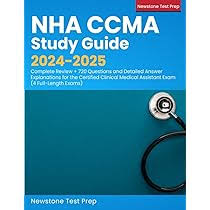Understanding the Foundation: NHA CCMA Certification Essentials
The National Healthcareer nha ccma study guide free pdf Association’s Certified Clinical Medical Assistant examination stands as a crucial milestone for aspiring healthcare professionals today. Medical assistants seeking to validate their expertise through certification must thoroughly prepare for this comprehensive assessment of their skills. Understanding the fundamental components of the NHA CCMA examination helps candidates develop an effective study strategy for success.
Navigating Free Study Resources: A Strategic Approach
Healthcare professionals pursuing their CCMA certification can access numerous complimentary study materials through various reputable online platforms and organizations. Medical assistant candidates should begin their preparation journey by exploring the NHA’s official website for valuable free resources. Additionally, aspiring medical assistants can benefit from joining professional healthcare forums where experienced professionals share their examination experiences.
Clinical Procedures and Patient Care Fundamentals
The examination extensively covers essential clinical procedures that medical assistants must master to provide optimal patient care in healthcare settings. Medical professionals must demonstrate proficiency in vital signs measurement, patient positioning techniques, and proper infection control protocols. Furthermore, candidates should focus on understanding proper documentation procedures and maintaining accurate patient medical records throughout their daily duties.
Anatomy and Physiology: Building Strong Medical Knowledge
Successful CCMA candidates must possess comprehensive knowledge of human anatomy and the intricate workings of various body systems. Medical assistants should dedicate significant study time to understanding the cardiovascular system’s complex functions and interactions. Moreover, healthcare professionals must thoroughly comprehend the respiratory system’s mechanisms and its relationship with other bodily functions.
Administrative Responsibilities and Medical Office Management
Healthcare facilities rely on medical assistants to maintain smooth operations through efficient administrative management and organizational skills. Medical professionals must understand proper scheduling procedures, insurance verification processes, and effective communication with insurance companies. Additionally, candidates should focus on mastering medical coding principles and maintaining compliance with healthcare documentation requirements.
Pharmacology and Medication Administration Essentials
The certification examination thoroughly assesses candidates’ knowledge of proper medication administration techniques and pharmaceutical safety protocols. Medical assistants must demonstrate understanding of different medication classes, their effects, and potential adverse reactions. Furthermore, healthcare professionals should master proper documentation procedures for medication administration and inventory management requirements.
Laboratory Procedures and Specimen Collection
Healthcare facilities depend on medical assistants to perform various laboratory procedures while maintaining strict adherence to safety protocols. Medical professionals must understand proper specimen collection techniques and the importance of maintaining specimen integrity. Additionally, candidates should master proper labeling procedures and documentation requirements for laboratory specimen handling.
Medical Law and Ethics: Professional Standards
Healthcare professionals must demonstrate thorough understanding of medical laws, ethical principles, and professional standards governing medical assistant practice. Medical assistants should study patient privacy regulations, including HIPAA requirements and proper protected health information handling. Moreover, candidates must comprehend the scope of practice limitations and professional boundaries within healthcare settings.
Emergency Preparedness and Safety Protocols
The examination evaluates candidates’ knowledge of emergency procedures and their ability to respond effectively in critical situations. Medical assistants must understand proper emergency response protocols and maintain current CPR and first aid certifications. Furthermore, healthcare professionals should master proper documentation procedures for incident reporting and emergency situation management.
Communication Skills and Professional Development
Successful medical assistants must possess excellent communication skills to interact effectively with patients, colleagues, and healthcare providers. Healthcare professionals should focus on developing strong verbal and written communication skills for various clinical situations. Additionally, candidates must understand proper documentation procedures and maintain professional relationships within healthcare settings.
Examination Preparation Strategies and Test-Taking Tips
Effective study strategies and proper time management skills contribute significantly to successful completion of the CCMA examination. Medical assistant candidates should create structured study schedules and utilize various learning resources to reinforce their knowledge. Moreover, healthcare professionals should practice time management techniques and develop effective test-taking strategies before examination day.
Building Confidence Through Practice Assessments
Regular practice examinations help candidates identify knowledge gaps and strengthen their understanding of various certification examination topics. Medical assistants should utilize free practice questions available through reputable online resources and study guide websites. Furthermore, healthcare professionals should track their progress and adjust their study plans based on practice assessment results.
Maintaining Focus and Managing Test Anxiety
Healthcare professionals must develop effective strategies for managing test anxiety and maintaining concentration during the certification examination. Medical assistant candidates should practice relaxation techniques and maintain positive mindsets throughout their preparation journey. Additionally, professionals should ensure proper rest and nutrition to optimize their performance during examination day.
Conclusion:
The journey toward CCMA certification requires dedication, comprehensive preparation, and utilization of available study resources for optimal success. Medical assistants should approach their examination preparation with confidence while maintaining focus on their professional development goals. Through proper preparation and utilization of free study materials, healthcare professionals can achieve their CCMA certification objectives.
